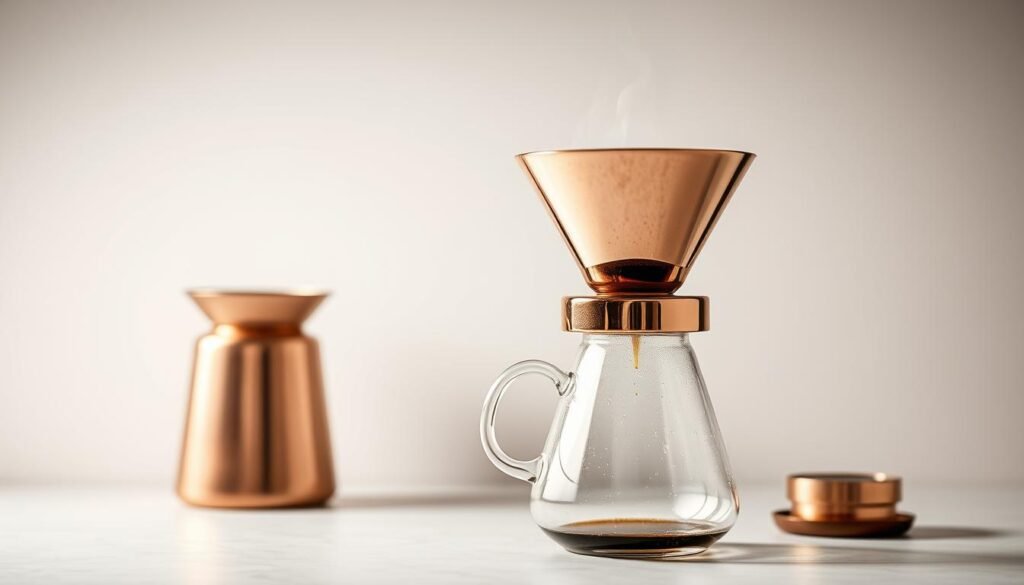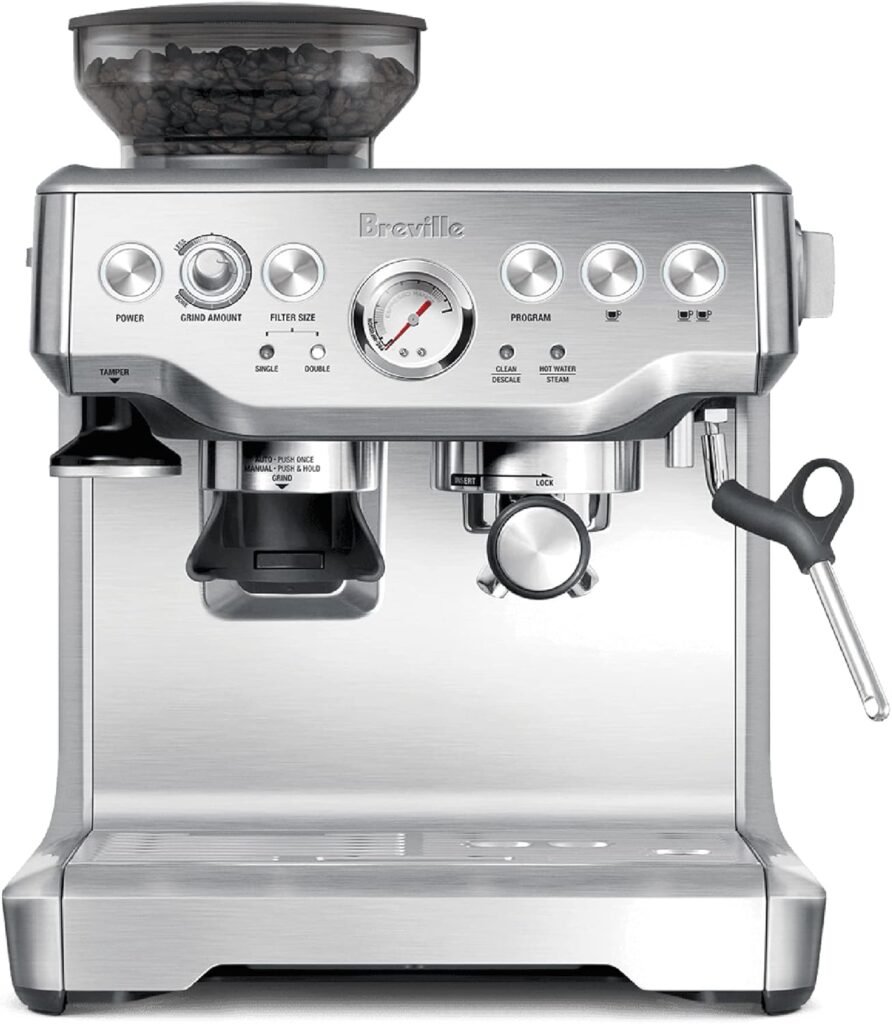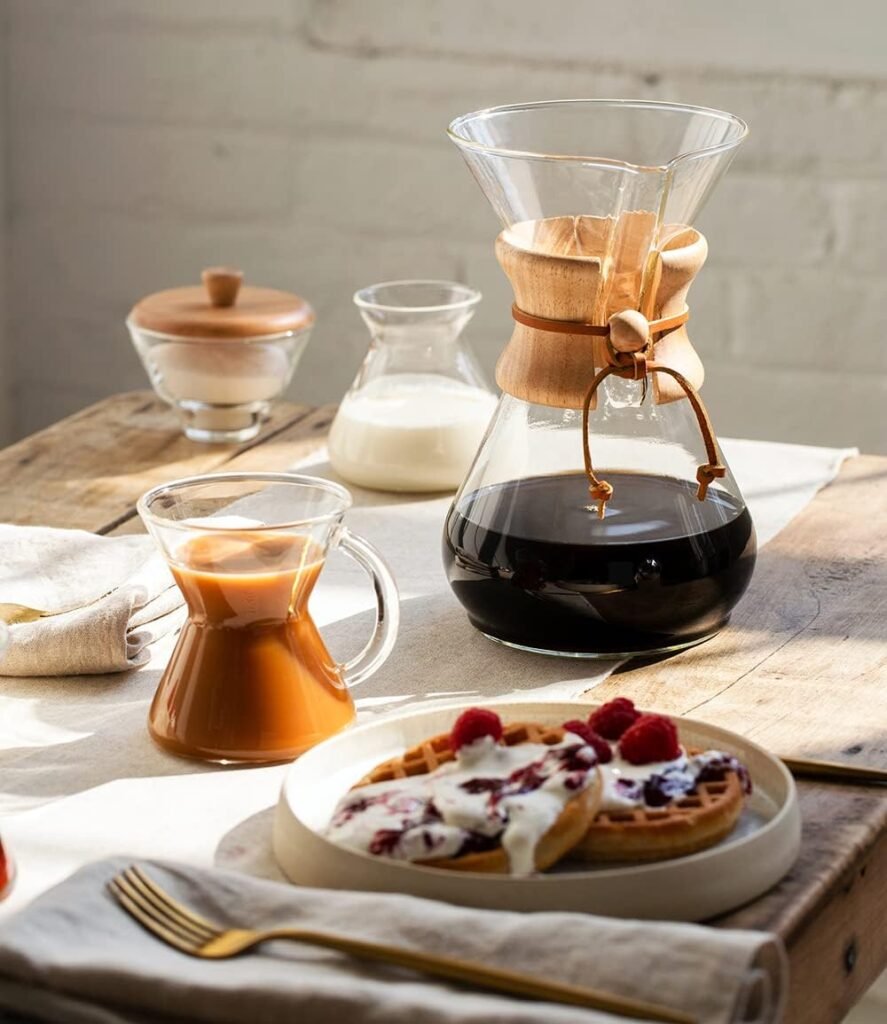Did you know that water makes up about 98% of brewed coffee? This astonishing fact highlights the critical role water plays in crafting the perfect cup. As a coffee enthusiast, I’ve discovered that the type of water used can dramatically impact the taste and quality of coffee.
The same coffee beans can yield vastly different flavors when brewed with different types of water. This variability is due to water’s role as a solvent that extracts flavors and minerals from the coffee. Many coffee lovers struggle to replicate the café experience at home, despite using the same coffee beans. In this article we’ll learn What’s the Best Water for Brewing Coffee?
Key Takeaways
- The quality of water significantly affects the taste of brewed coffee.
- Water constitutes about 98% of brewed coffee, making it a crucial ingredient.
- The type of water used can dramatically change the flavor profile of coffee.
- Using the right water can elevate the home brewing experience.
- Experts recommend paying attention to the mineral content in water for optimal brewing.
Why Water Quality Makes or Breaks Your Coffee
When it comes to brewing the perfect cup of coffee, the importance of water quality cannot be overstated. Water is not just a passive ingredient in the brewing process; it’s an active participant that significantly influences the final taste and quality of your coffee.
The 98% Factor: Water as Coffee’s Main Ingredient
It’s fascinating to note that water constitutes about 98.5% of filter coffee and 90% of espresso, making it the dominant ingredient by volume. This fact underscores the critical role water plays in the brewing process. The chemical composition of water determines which flavors are extracted from the coffee grounds, directly impacting the taste of the coffee in your cup.
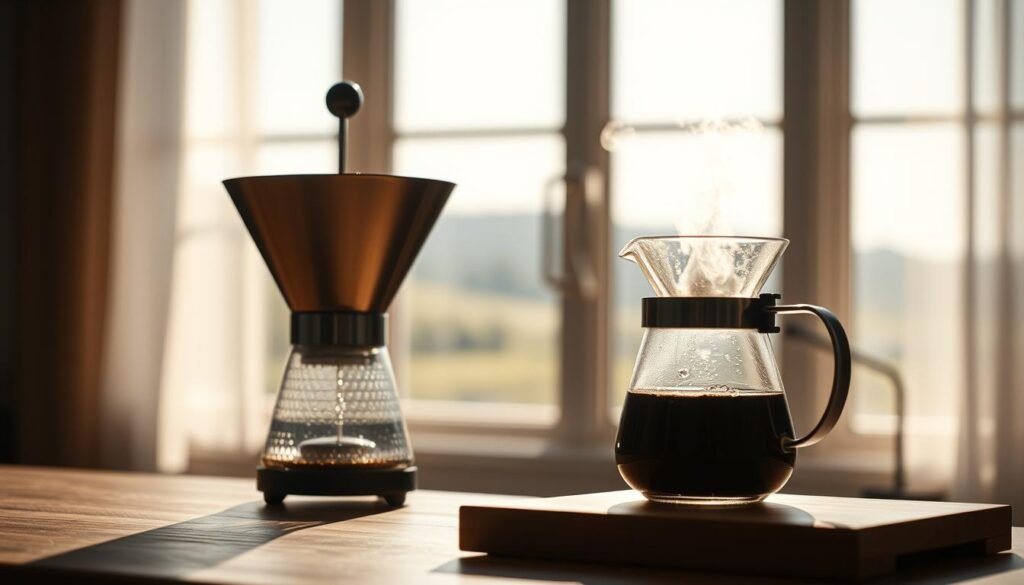
Water as a Solvent: How It Extracts Coffee Flavors
Water acts as a solvent that extracts various compounds from coffee grounds. The ideal water for coffee is soft, contains no chlorine, has about 150 ppm Total Dissolved Solids (TDS), and a pH of 7.0. These characteristics enable water to extract the maximum amount of flavor out of coffee beans as it percolates through them. Improper water quality can lead to under-extraction, resulting in sour and weak coffee, or over-extraction, leading to bitter and harsh coffee.
| Water Characteristics | Ideal Values for Coffee |
|---|---|
| Total Dissolved Solids (TDS) | 150 ppm |
| pH Level | 7.0 |
| Chlorine Content | Zero |
The mineral content in water not only affects the extraction process but also influences the perception of flavor, body, and mouthfeel in the brewed coffee. The coffee industry has recently begun to seriously study the impact of water on coffee quality, revealing the dramatic differences in taste that can occur when brewing the same coffee with different water sources.
Understanding Water Chemistry for Better Coffee
Brewing the perfect cup of coffee requires more than just high-quality beans; it also demands a deep understanding of water chemistry. The quality of water used can significantly impact the flavor and overall quality of the brewed coffee.
Total Dissolved Solids (TDS): What It Means for Your Brew
Total Dissolved Solids (TDS) measures all the minerals and compounds dissolved in water. For coffee brewing, the ideal TDS range is typically between 30-150 ppm (parts per million). This range ensures that the water contains enough minerals to enhance the coffee’s flavor without overpowering it.
The TDS level affects the extraction process, with optimal levels contributing to a balanced flavor. Using a TDS meter can help you determine your water’s TDS level.
Hardness vs. Alkalinity: The Critical Balance
Understanding the difference between general hardness (GH) and carbonate hardness (KH or alkalinity) is crucial. GH refers to the concentration of calcium and magnesium ions, while KH measures the water’s buffering capacity, primarily due to bicarbonates. The balance between GH and KH significantly affects the extraction process and the final taste of the coffee.
A widely recommended ratio is maintaining a 2:1 balance between hardness and alkalinity. This balance ensures optimal extraction and flavor.
Measuring Your Water Quality at Home
To measure your water quality at home, you can use a TDS meter to determine the total dissolved solids, and GH/KH test kits to assess the general hardness and carbonate hardness. These tools provide valuable insights into your water’s chemistry, helping you adjust it for optimal coffee brewing.
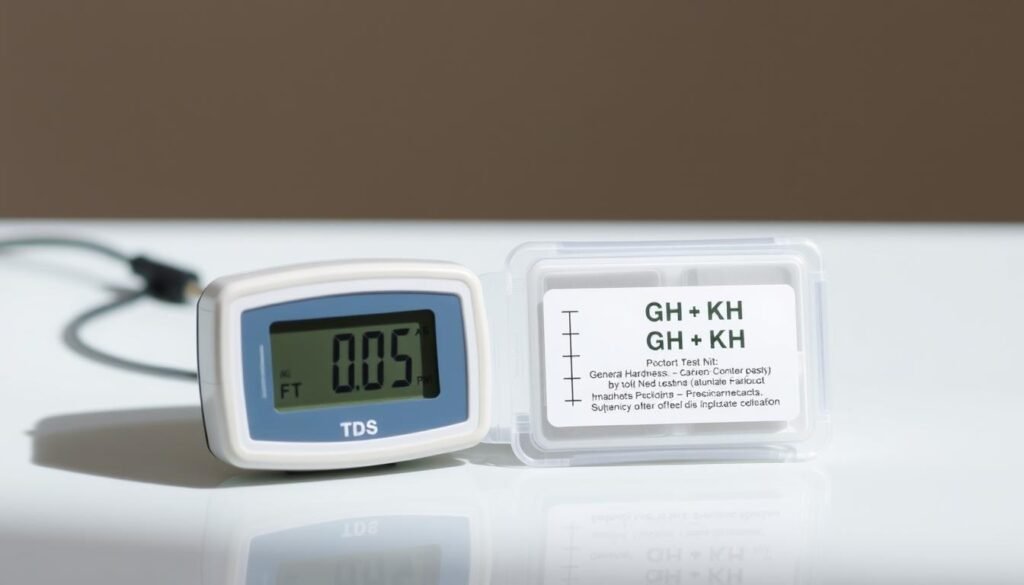
The Best Water for Coffee According to Experts
To brew coffee that rivals the best coffee shops, it’s essential to understand what experts say about the ideal water for coffee. The quality of water used in brewing is a critical factor that can make or break the flavor of the coffee.
The Ideal Water Profile: What Science Says
Research has shown that the ideal water profile for brewing coffee is not a one-size-fits-all solution. However, there is a general consensus among coffee scientists and industry experts on the optimal water parameters. The Total Dissolved Solids (TDS) in water, which measures the concentration of dissolved minerals, is a key factor. While the widely recommended TDS range is between 30-100 ppm, some coffee roasts may require adjustments to this range for optimal flavor.
The Specialty Coffee Association (SCA) has established water standards that recommend a TDS range of 75-250 ppm, with calcium hardness between 50-175 ppm and alkalinity between 40-75 ppm. These parameters create an optimal environment for proper extraction and flavor development in coffee.
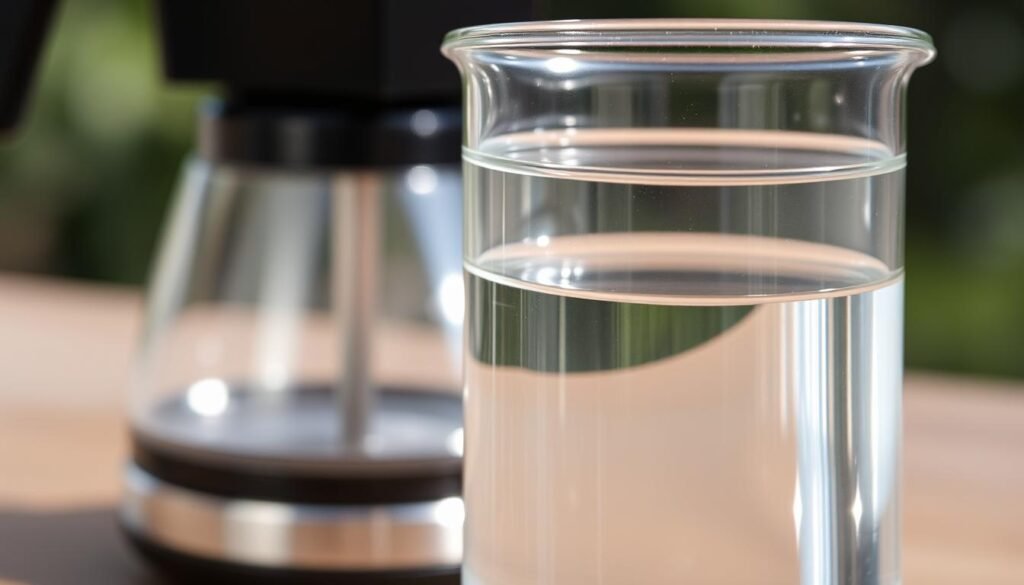
Specialty Coffee Association Standards
The SCA standards are widely adopted in the coffee industry as a benchmark for water quality. By adhering to these standards, coffee brewers can ensure that their water is neither too pure nor too mineral-rich, both of which can negatively impact the taste of the coffee. The SCA guidelines provide a foundation for achieving a balanced extraction that brings out the best flavors in coffee.
Expert Recommendations for Different Brewing Methods
Experts agree that different brewing methods may require slightly different water profiles. For instance, brewing espresso requires water with a specific profile that can withstand the high pressure and temperature involved. On the other hand, pour-over and immersion brewing methods may benefit from water with a different TDS and mineral composition. Renowned coffee experts like Maxwell Colonna-Dashwood and Christopher Hendon, authors of “Water for Coffee,” have shared insights into how different brewing methods can be optimized with the right water profile.
Ultimately, while there are scientific guidelines for the ideal water profile, there is still room for personal preference and experimentation. Coffee enthusiasts can experiment with different water profiles to find the one that works best for their brewing method and coffee beans.
Tap Water for Coffee: The Good, Bad, and Ugly
The convenience of tap water makes it a popular choice for coffee brewing, but its quality can vary significantly. As a coffee enthusiast, understanding these variations is crucial for achieving the perfect brew.
Regional Variations in Tap Water Quality
Tap water quality differs dramatically by region. For instance, cities like Oslo, Norway, have naturally soft water that’s ideal for coffee, while other areas may have extremely hard water that’s problematic. Hard water, in particular, can cause scale buildup in coffee machines, affecting their longevity and performance.
Common Problems with Tap Water
Several issues can arise when using tap water for coffee brewing. Chlorine or chloramines added during municipal water treatment can create off-flavors, while excessive hardness can lead to equipment damage. High alkalinity in tap water can also mute the acidity of coffee, resulting in a less flavorful brew.
| Issue | Effect on Coffee | Potential Solution |
|---|---|---|
| Chlorine/Chloramines | Off-flavors, bitter taste | Use a water filter |
| Excessive Hardness | Scale buildup, equipment damage | Water softener or scale-reducing filter |
| High Alkalinity | Mutes coffee acidity | Use water with balanced pH |
When Tap Water Works Well for Coffee
In regions with naturally soft water, tap water can be a suitable choice for coffee brewing without additional treatment. However, it’s essential to test your tap water to determine its suitability. Simple tests can help identify potential issues with hardness, alkalinity, or presence of chlorine/chloramines.
Ultimately, while tap water’s convenience is a significant advantage, its potential impact on coffee flavor and equipment must be considered. By understanding the characteristics of your local tap water, you can make informed decisions about whether to use it as is or to implement additional water treatment for optimal coffee brewing.
Bottled Water for Coffee: Which Brands Work Best
Bottled water is a popular choice for coffee brewing, but its convenience comes with some drawbacks. On one hand, bottled water provides a consistent taste and quality, which can be beneficial for coffee brewing. However, the significant disadvantage is the plastic waste generated with each serving.
About 60 million plastic water bottles are disposed of daily in the United States, with most not being recycled. This contributes to the growing problem of microplastics in the environment. Despite this, some coffee professionals recommend specific bottled water brands, such as Volvic, Crystal Geyser, and Tesco Ashbeck in the UK, for their suitable mineral content and pH levels.
Popular Bottled Waters Among Coffee Enthusiasts
Certain bottled waters work well for coffee due to their appropriate mineral content and TDS (Total Dissolved Solids) levels. For instance, Volvic and Crystal Geyser are often praised for their balanced mineral profiles, which enhance the taste of coffee without overpowering it. On the other hand, highly mineral-rich waters like San Pellegrino or Evian might not be ideal as they can alter the coffee’s flavor profile significantly.
To identify suitable bottled water for coffee, it’s essential to read the mineral content labels. Look for water with a TDS level between 75 and 250 mg/L, which is generally considered optimal for brewing coffee. Understanding the mineral composition can help in selecting a bottled water that complements the coffee’s flavor.
Environmental Considerations and Alternatives
The environmental impact of using bottled water for coffee is significant, primarily due to plastic waste and the carbon footprint from transportation. To mitigate this, coffee enthusiasts can consider more sustainable alternatives, such as using refillable containers or water delivery services that offer eco-friendly packaging.
Comparing the costs, bottled water can be more expensive in the long run than other water treatment options for coffee brewing. For instance, investing in a water filtration system at home can be more cost-effective and reduce plastic waste. By weighing these factors, coffee lovers can make an informed decision that balances taste preferences with environmental responsibility.
Advanced Water Solutions: RO and Distilled Water
For coffee enthusiasts seeking the perfect cup, advanced water solutions like reverse osmosis (RO) and distilled water offer a promising starting point. These technologies provide a high level of control over water composition, which is crucial for optimal coffee brewing.
Reverse Osmosis Systems: Benefits and Limitations
Reverse osmosis systems are highly effective at removing contaminants from water, making them an excellent choice for coffee brewing. By using a semipermeable membrane, RO systems can eliminate up to 99% of impurities, resulting in very pure water. However, this purity can be a double-edged sword, as water lacking minerals can lead to poor coffee extraction and potentially damage coffee equipment.
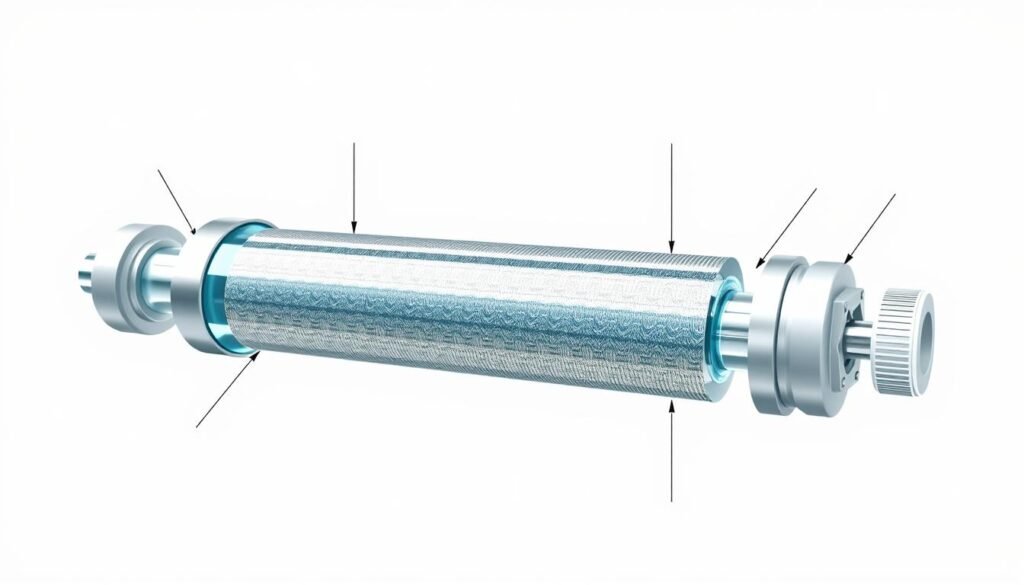
Distilled Water: Why It Needs Modification
Distilled water, similar to RO water, is very pure but lacks the minerals necessary for optimal coffee brewing. Using distilled water alone can result in a disappointing cup of coffee and may also cause damage to coffee makers by leaching minerals from metal components.
Remineralization: Adding Back What’s Needed
To address the issue of mineral deficiency in RO and distilled water, remineralization is essential. This process involves adding specific minerals back to the purified water to create an ideal coffee brewing profile. Various remineralization approaches are available, including commercial cartridges, mineral packets, and DIY solutions.
By combining advanced water treatment technologies like RO with remineralization, coffee enthusiasts can achieve precise control over their brewing water’s composition. This level of control enables brewers to tailor their water to specific coffee origins or roast levels, ultimately leading to a more satisfying cup of coffee.
DIY Coffee Water Recipes and Mineral Additives
For coffee enthusiasts looking to elevate their brewing game, experimenting with DIY coffee water recipes can be a game-changer. The quality of water used in brewing significantly affects the taste of the coffee, and customizing it can lead to a more balanced and flavorful cup.
Popular DIY Water Formulas from Coffee Experts
Coffee experts have developed various DIY water recipes to enhance the brewing experience. For instance, the “rpavlis” water recipe for espresso and Michael Cameron’s “Holy Water” for filter coffee have gained popularity among coffee aficionados. These recipes involve adding specific minerals such as calcium chloride, magnesium sulfate, and potassium bicarbonate to reverse osmosis (RO) water to achieve the desired flavor profile.
The components of these recipes play a crucial role in the final taste of the coffee. For example, calcium chloride can enhance the body and sweetness of the coffee, while magnesium sulfate can contribute to a brighter acidity.
Commercial Mineral Additives: Third Wave Water and Others
For those who prefer a more straightforward approach, commercial mineral additives like Third Wave Water, Perfect Coffee Water, and Aquacode are available. These products offer a convenient way to adjust the mineral composition of your brewing water. Third Wave Water is particularly popular, involving simply adding the contents of a sachet to a gallon of RO water.
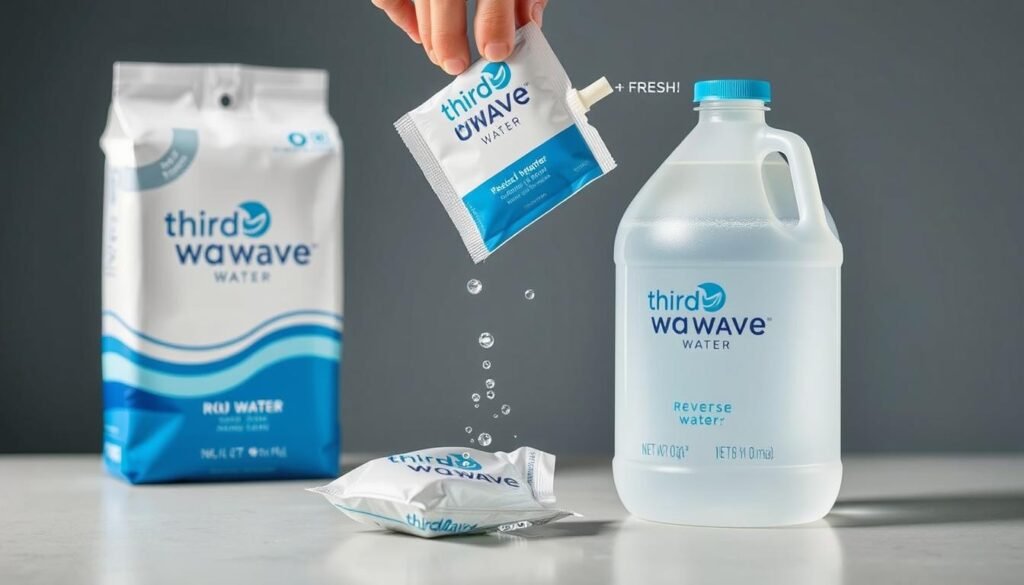
Other brands like Aquacode and Perfect Coffee Water also provide pre-formulated mineral blends designed to optimize coffee flavor. These products can be especially useful for those new to adjusting their brewing water or looking for a consistent taste.
My Experience with Different Water Recipes
In my experience, experimenting with different water recipes has revealed the significant impact that water composition can have on the flavor of the coffee. For instance, using a recipe with a higher concentration of minerals can bring out the sweetness in certain coffee beans, while a lighter formulation might accentuate the acidity.
By adjusting the mineral composition of the brewing water, coffee enthusiasts can tailor their coffee to their taste preferences, whether that’s enhancing the body, acidity, or overall flavor complexity.
Conclusion: Finding Your Perfect Coffee Water Balance
As we conclude our exploration of water’s role in coffee brewing, it’s evident that the right approach depends on individual preferences and circumstances. The journey to perfecting your cup of coffee is highly personal and influenced by factors such as taste preferences, equipment, and budget.
To start, it’s essential to understand that there’s no one-size-fits-all solution when it comes to water for coffee brewing. The key is to find a balance that works for you. I recommend beginning with simple solutions like using filtered tap water and then progressing to more advanced methods as needed.
Key Considerations: When deciding on a water solution, consider your equipment, the type of coffee you’re brewing, and your personal taste preferences. It’s also crucial to maintain consistency in water quality over time to achieve repeatable brewing results.
Some common pitfalls to avoid include overcomplicating the process and overspending on unnecessary equipment. Instead, focus on making incremental adjustments to your water composition to discover what works best for your favorite coffees. Trust your taste buds and be willing to experiment.
By adopting a progressive approach to water experimentation and considering the various factors that influence your coffee’s taste, you’ll be well on your way to finding your perfect coffee water balance. Whether you’re brewing at home or in a coffee shop, the right water can elevate your coffee experience, making every cup a delight.
In the end, achieving the perfect cup of coffee is a journey that involves balancing multiple variables, including water quality, bean quality, grind size, brewing method, and technique. By understanding the role of water in this process and making informed decisions, you can significantly enhance your home brewing experience.
